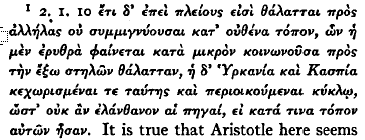No CrossRef data available.
Article contents
Notes on Two Passages of Strabo
Published online by Cambridge University Press: 11 February 2009
Extract
There are some passages in Strabo where corruption of the text is not obvious at first reading, because the existing text offers no grammatical difficulty and can even be translated in such a way as to satisfy the less wary reader. One is driven to conclude that emendation is necessary only when one realizes that Strabo's argument demands something different from that which the manuscripts offer. There is an interesting example of such a passage in 11. 7. 4.
- Type
- Research Article
- Information
- Copyright
- Copyright © The Classical Association 1951
References
page 80 note 1 Cf., e.g., Tarn, , Alexander the Great, ii, p. 9Google Scholar: ‘the Syr could never have entered our Caspian unless it ran uphill’.
page 80 note 2 Cf. later in the chapter ![]()
![]()
page 81 note 1 This is H. L. Jones's text in the Loeb edition, except for one change in punctuation. He puts a full stop after ![]() and a comma after
and a comma after ![]() (lines 5–6). I prefer to put a colon after
(lines 5–6). I prefer to put a colon after ![]() and make the
and make the ![]() clause part of the preceding sentence: the explanation which starts with
clause part of the preceding sentence: the explanation which starts with ![]() in line 3 is incomplete without it.
in line 3 is incomplete without it.
page 81 note 2 For the fragments see Jacoby, F., Die Fragmente der griech. Historiker, ii B, No. 128.Google Scholar
page 81 note 3 These arguments appear again in Diod. 17. 75. 3 and Quint. Curt. 6. 4. 18.
page 81 note 4 Some editors omit the comma after ![]() and take the
and take the ![]() clause as governed by
clause as governed by ![]() Then the
Then the ![]() is redundant, and so Gronovius read
is redundant, and so Gronovius read ![]() instead of the participle.
instead of the participle.
page 81 note 5 Cf. his use of ![]() later in the paragraph, when he describes the argument of writers who supported the opinion of Polycleitus: (1) They observed that fir-trees grew beyond the Jaxartes; (2) They believed that fir did not grow in the interior of Asia; (3) They therefore inferred that beyond the Jaxartes was European soil.
later in the paragraph, when he describes the argument of writers who supported the opinion of Polycleitus: (1) They observed that fir-trees grew beyond the Jaxartes; (2) They believed that fir did not grow in the interior of Asia; (3) They therefore inferred that beyond the Jaxartes was European soil.
page 82 note 1  to think of the Hyrcanian and the Caspian as separate seas; but this is not yet proof that he knew about the Sea of Aral. A note in the translation of Webster, E. W. (Works of Aristotle Translated, ed. Ross, W. D., vol. iii)Google Scholar suggests either (i) Aristotle has misinterpreted earlier writers, thinking they meant different seas when they spoke of ‘Hyrcanian’ and ‘Caspian’, or (2) he thought of the two as different parts of the same sea, ‘in the way in which the Aegean and Adriatic might be called distinct seas by a writer who knew they were one in a sense’.
to think of the Hyrcanian and the Caspian as separate seas; but this is not yet proof that he knew about the Sea of Aral. A note in the translation of Webster, E. W. (Works of Aristotle Translated, ed. Ross, W. D., vol. iii)Google Scholar suggests either (i) Aristotle has misinterpreted earlier writers, thinking they meant different seas when they spoke of ‘Hyrcanian’ and ‘Caspian’, or (2) he thought of the two as different parts of the same sea, ‘in the way in which the Aegean and Adriatic might be called distinct seas by a writer who knew they were one in a sense’.
page 82 note 2 Arrian, , Anab. 4. 15. 4.Google Scholar
page 82 note 3 As corroboration of the Aristotle passage Tarn cites what he calls ‘the Gazetteer’—i.e. the passage in Diod. 18. 5 giving a summary description of the Asiatic empire, in which both Caspian and Hyrcanian Seas appear (though not in the same sentence and not distinguished one from the other as in Aristotle); but this passage cannot be used as proof because Diodorus himself regards ‘Caspian’ and ‘Hyrcanian’ as alternative names for the same sea (17. 75. 3). Nor is this use of the terms as alternates merely post-Aristotelian; it is as old as Herodotus, who uses ‘Caspian’ for our Caspian (1. 203, where the context shows he cannot possibly mean any other sea), while Hecataeus called the same sea ‘Hyrcanian’ (F. 291, Jacoby = Athen. 2. 70A ![]()
![]() mark (p. 5) that ‘the name “Caspian” originally belonged to the Aral’ is completely unwarranted.
mark (p. 5) that ‘the name “Caspian” originally belonged to the Aral’ is completely unwarranted.
page 82 note 4 ![]()
![]() Correction of
Correction of ![]() Instead of simply eliminating the tau I suggest reading
Instead of simply eliminating the tau I suggest reading ![]() Meineke felt the need for a
Meineke felt the need for a ![]() and inserted it after
and inserted it after ![]() It serves to indicate the scorn which Strabo feels for all this fraudulent geography and also to emphasize the limited application of the
It serves to indicate the scorn which Strabo feels for all this fraudulent geography and also to emphasize the limited application of the ![]() -not support of all Polycleitus' theory, but in support in of his identification of the rivers.
-not support of all Polycleitus' theory, but in support in of his identification of the rivers.
page 85 note 1 Arrian, Anab. 3. 15. 4.
page 85 note 2 Ibid. 3. 15. 2; Quint. Curt. 5. 1. 2.


